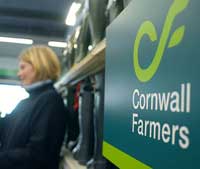Cornwall Farmers freezes accounts after £2.6m loss

West Country farmer co-operative Cornwall Farmers has frozen its capital accounts after making a loss of £2.6m this year. But it expects to return to profit in 2011 following a shake up of its executive team and restructuring of its trading businesses.
The £2.6m loss was mainly due to one-off losses, with £1.5m attributed to the trading and disposal of its loss-making machinery division, and £1m put down to adjustments of over-valued assets on the balance sheet, plus some restructuring costs. That left a £100,000 trading loss on a turnover of £68m – similar to last year.
Simon Birch, who was appointed chief executive in May, said the co-op had had a tough year of restructuring, but he was confident about the future.
“There’s no denying that parts of the business have suffered in recent years and, if I’m brutally honest, could have been better run. By adopting a more commercial approach we will ensure the long-term success of the business.”
The co-op, which is owned by 4200 members with £6m in capital accounts, will not be paying a dividend this year, and will not allow capital withdrawals until further notice. “We will be back into profitability in 2011, and our expectation is to make a dividend payment next year,” said Mr Birch. “As soon as we are able to open the capital accounts we will do so, although that will take a little longer.”
Mr Birch had brought in a new executive team, with commercial and financial skills to complement existing agricultural knowledge. Using funds from the sale of Cornwall Farmers’ machinery arm, the company had cut borrowings from around £9.7m to £6m, and expected to reduce this further to £5m next year.
West Country also planned to reinvest in the retail and core agricultural side of the business, with a larger direct sales force to improve the agricultural sales service.
“But the biggest area of improvement will come from being better at the way we buy and transport our goods. We have some very successful relationships with our suppliers, but we are not very efficient at how we transport our items. Improving our supply chain, storage and logistics will be a major focus.”
The team had also requested a review into whether an all-farmer board of directors was the most appropriate governance structure, the results of which would be put to members at the AGM in the New Year.
Although Mr Birch acknowledged that members would find the capital account and dividend freeze difficult to accept, he insisted that the business would be stronger as a result. “It’s not a decision we have taken lightly, and we need our members understand, and to buy into the future, which looks very exciting.”

